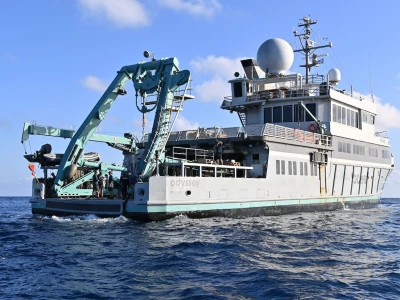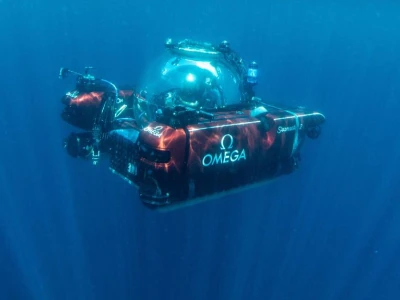
Maldives deep sea expedition concludes with new discoveries
The discoveries of the study will be confirmed once the information collected has been analysed.
Top Stories
-
Ministry to assess repairs at Sinamalé, Malé Hiyaa flats
-
Authorities asked to probe blasphemous insults in TikTok live
-
Fine waiver, MVR 100k allowance for Sinamalé, Malé Hiyaa flats
-
Referendum on merging elections with April 4 council polls
-
Fenaka Saeed transferred to house arrest over health reasons
By
Aman Haleem
The first-ever Maldives deep sea expedition, mapping a large area of the sea from north of Male atoll to Addu atoll, has concluded, with new discoveries regarding the Maldivian seas.
The study, conducted in collaboration with the UK-based marine research foundation Nekton, is the first systematic study done to investigate the deeper waters of Maldives. The findings of the study will be used mainly to identify ways to prepare for climate change.
The 'Nekton Maldives Mission' study, which was conducted from 4 September to 5 October entails:
-
295 square kilometres of sea floor mapped
-
453 hours were spent totally, underwater
-
554 samples were taken; 186 species of fish and 201 of other sea creatures
-
Scientists from 10 countries participated
-
20 terabytes of video footage and other data collected
The study, which took divers 1,000 metres below surface sea level, collected data from samples of ocean life obtained via snorkelling, a submersible vessel and robotic equipment.
The submersible used in the study is named Omega Seamaster II, a vessel that eases deep sea transport with crew. Samples and video footage were also taken using stereo imagery and an instrument called the Manipulator Arm.
Information gathered in the study focused on data relative to ocean depth, underwater geography, ocean life, underwater temperature fluctuations and seawater salinity.
At a press conference held at the President's Office Saturday afternoon to mark the conclusion of the expedition, fisheries minister Dr Hussain Rasheed Hassan said that based on the findings of the studies, important work will be done for the future.
While no such study has been conducted in the Maldives in the past, the minister said the area mapped in the study is equivalent to the dry land area of Maldives. The minister also noted with pride that Maldivians are also taking part in analysing the findings of the research, as they had done in the expedition phase.
Sixteen Maldivians joined scientists from India and Sri Lanka in the expedition.
The minister was accompanied at the press conference by CEO of Nekton Oliver Steeds and British High Commissioner Caron Rohsler, who provided financial assistance through the British government.
The information gathered in the study is property of the Maldivian government and the research is a joint study conducted by Nekton and Maldives, based on the government's priorities, Steeds said.
The team of scientists from this historical study was led by Dr Lucy Woodall, and marine biologist Mohamed Shimal from the Maldives Marine Research Institute shared some key findings of the study.
Important discoveries made:
-
Some fish that were found in shallow waters were also found in deeper areas
-
Ocean life in open waters is more robust 500 metres below sea level than above it
-
Some reefs have been badly damaged, but some have maintained vitality
-
Ocean depth in ancient times
-
Damage caused by human actions.
The discoveries of the study will be confirmed once the information collected has been analysed.
After completing analysis of the research findings, there will be a taxonomic workshop, scheduled for the end of this year. The workshop will look into the ocean life that has been detected, to identify if a new creature had been discovered.
The first discoveries of the study will be released early next year.




